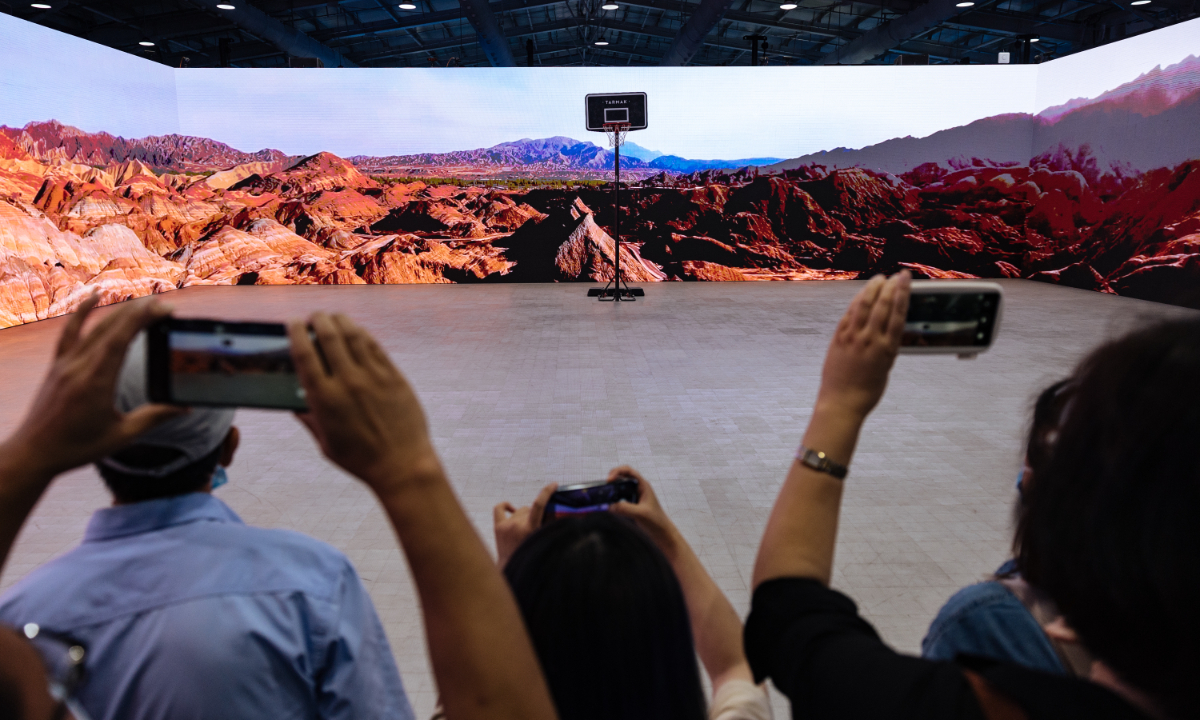Metaverse industry sees explosive growth in China; early applications in spotlight at CIFTIS
Explosive growth in China will drive consumption
Half a year ago, the metaverse was a novel concept that few Chinese people knew. But now, sensations surrounding the virtual technology have been reverberating across the country, which peaked in recent days with the debuts of a host of metaverse-themed experience halls - crowded with tech-savvy visitors as well as passionate technocrats and entrepreneurs - at virtually every global event hosted in China.
The past months have witnessed the explosive growth of China's metaverse industry from naught to a massive market, with the earliest applications such as digital humans, conferences in a virtual reality setting and holograms gradually taking shape.
The rapid development underscores China's edges in the next global tech battlefield, partly fueled by an early layout of digital infrastructure and adeptness in translating emerging technologies into applications. Observers and market insiders also expect the metaverse industry, in synergy with the physical world, to play a key role in unleashing consumption power in the world's second-largest economy and drive its tech and digital progress.
A metaverse experience hall, which debuts at the 2022 China International Fair for Trade in Services (CIFTIS), the first-of-such-kind in the global fair, was filled with visitors vying for hands-on experience of the latest metaverse technologies and applications on Friday. The hall is one of the most-visited exhibitions staged at Shougang Park in western Beijing.
The ocean-colored hall features multiple firms showcasing digital humans, conferences in a virtual reality setting, holograms, among other exhibits. A large-scale immersive human-computer interaction system called metasense was also on display at the hall, enabling a basketball shooting contest that sees artificial intelligence (AI) replacing traditional referees. Game players' each move, score and foul were scoured by the AI referee.
Shan Qianshuo, a business manager of O2VR, a Beijing-based developer of a metaverse meeting system, told the Global Times on Friday during CIFTIS that metaverse meetings are one of the viable applications around the metaverse. In O2VR's case, a metaverse-based convention, exhibition, shopping mall and livestreaming studio could simply be up and running on a web page. The download of apps to access the metaverse is no longer a must, thereby allowing for a quicker access to metaverse experience with much lower latency.
Virtual human exhibits have also made a big part of the CIFTIS' metaverse exhibition, showcasing at the annual services trade fair.
Digital humans are increasingly populating the domestic entertainment, finance and other sectors, as they are seen as a more secured and lower-cost alternative to brand ambassadors, Bao Wenbo, chief branding officer of Beijing Haibaichuan Technology Co, a virtual human developer, told the Global Times on Friday on the sidelines of the CIFTIS.

Photo: Li Hao/GT
The 5th World Artificial Intelligence Conference (WAIC2022), which took place in Shanghai on Thursday and lasted until Saturday, has also set metaverse as a key theme and one of its key exhibitions. The extensive emphasis on the revolutionary tech echoes with a plan Shanghai issued in July, which aims to promote a number of futuristic innovations at the metropolis, including the metaverse.
According to Shan, certain applications such as webpage-based metaverse meetings are trending in both China and abroad. But he took note of China's adeptness in translating emerging technologies into applications, which he believes will offer the country a head start in metaverse applications.
Although difficulty in hardware tech breakthrough, which bridges the virtual world with the real world, may strangle China's metaverse development, the country's rich digital infrastructure, fast 5G network and advanced manufacturing prowess could smooth out tech bottleneck to a certain extent, observers said.
"As blockchain is one of the underlying technologies that drive the metaverse development, China is shown to be in favor of a more regulated roadmap toward metaverse, in that the country takes a harsher regulatory stance on blockchain," Bao said.
It is expected that the metaverse market in China will hit 40 trillion yuan ($5.79 trillion) by 2030, equivalent to 20 percent of China's GDP, and the electronic products and wearable devices in metaverse will be worth $100 billion, said Liu Minghua, the deputy chief executive officer of Deloitte China during the WAIC2022.
Qian Jun, founder and CEO of Vastai Technologies, a Shanghai-based semiconductor company told the Global Times during the WAIC2022 that if companies want to create a virtual world very similar to the real one, demands for computing power will be 1 million times higher than today's level.
That will in turn speed up tech development, pushing chip companies to jointly create a software and hardware ecosystem to provide computing power services to support a variety of metaverse scenarios, according to Qian.
In a speech to the opening of the WAIC2022 on Thursday, Cristiano Amon, president and CEO of Qualcomm, said that the metaverse represents an incredible opportunity to drive innovation and economic growth around the world.
"Maybe we can't say for sure so far what metaverse will bring us eventually. But one thing is for sure: a digital world operating on low-carbon, safe, high-speed, comprehensive digital information infrastructure will bring a sea of opportunities for industrial development and infinite possibilities to human society," Qian noted.
Xie Jun also contributed to this article





